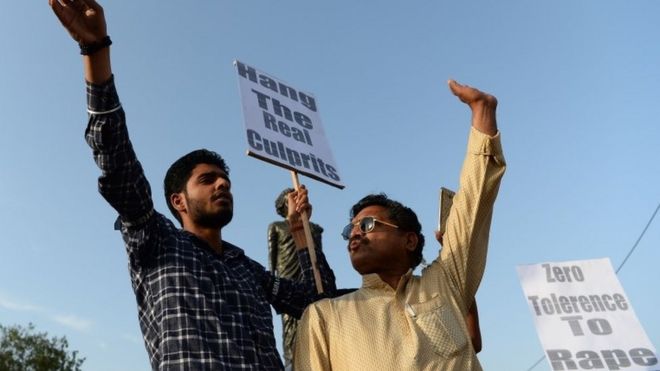
India's Cabinet has approved the introduction of the death penalty for those who rape children, amid uproar over a series of high-profile cases.
The change to the country's penal code applies to those convicted of raping a child under the age of 12.
There have been nationwide protests in recent weeks over the gang rape and murder of an eight-year-old girl.
The government has come under fire for not doing enough to prevent sexual-assault cases, many involving children.
A number of serious crimes in India carry the death penalty, but raping a child was not among them until now.
Nearly 19,000 cases were registered in India in 2016 - more than 50 each day.
- What do parents tell their children about rape?
- The hunger striker demanding death for rapists
- Why India's rape crisis shows no signs of abating
What's in the new law?The executive order was cleared at a special cabinet meeting chaired by Prime Minister Narendra Modi.
It allows capital punishment for anyone convicted of raping children under the age of 12.
Minimum prison sentences for rape against girls under the age of 16 and women have also been raised.
According to Reuters, which has seen a copy of the order, there was no mention of boys or men.
Why now?
Two recent rape cases have shocked the nation.
Protests erupted earlier this month after police released horrific details of the rape of an eight-year-old Muslim girl by Hindu men in Kathua, in Indian-administered Kashmir in January.
Anger has also been mounting after a member of the governing Bharatiya Janata Party (BJP) was accused last week over the rape of a 16-year-old girl in northern Uttar Pradesh state.
India's poor record of dealing with sexual violence came to the fore after the 2012 gang rape and murder of a student on a Delhi bus. This led to huge protests and changes to the country's rape laws.
But sexual attacks against women and children have since continued to be reported across the country.
How is the death penalty used in India?
Executions are rarely carried out in India, with just three recorded in the last decade.
The four men convicted in the Delhi bus case were sentenced to death, though this has not yet been carried out.
The judge in that case said it fell into "the rarest of rare category" which justifies capital punishment in India. India's penal code, according to the Hindustan Times, had already prescribed the death penalty for gang rape.
Hanging is the main method of execution. A man convicted of financing the deadly 1993 Mumbai bombings was the last person to be executed in India - in 2015.

No comments:
Post a Comment